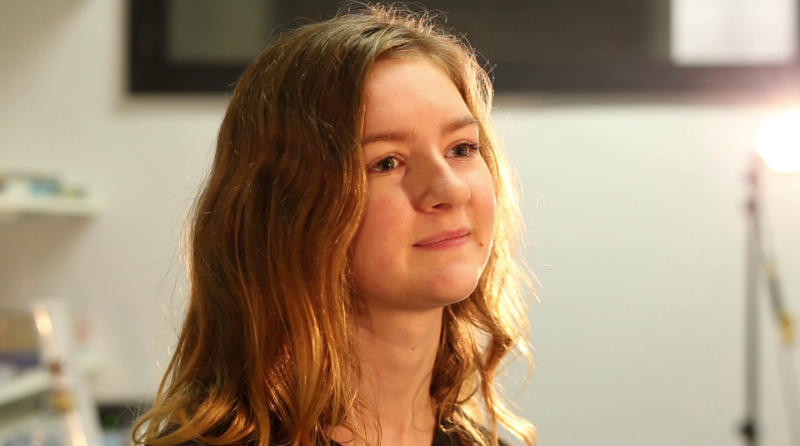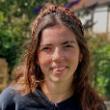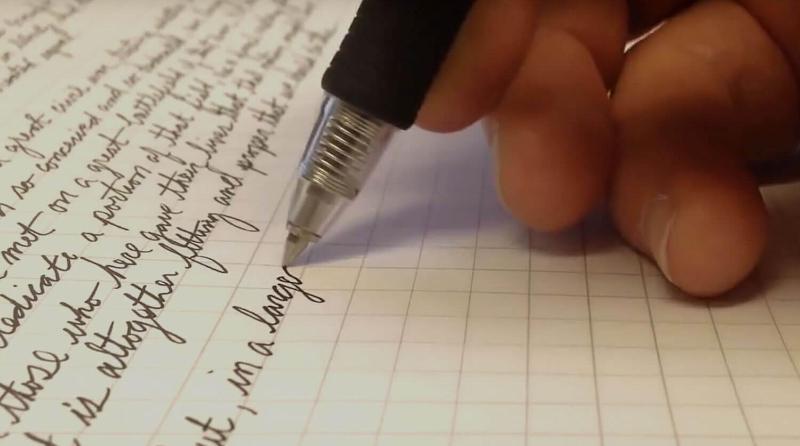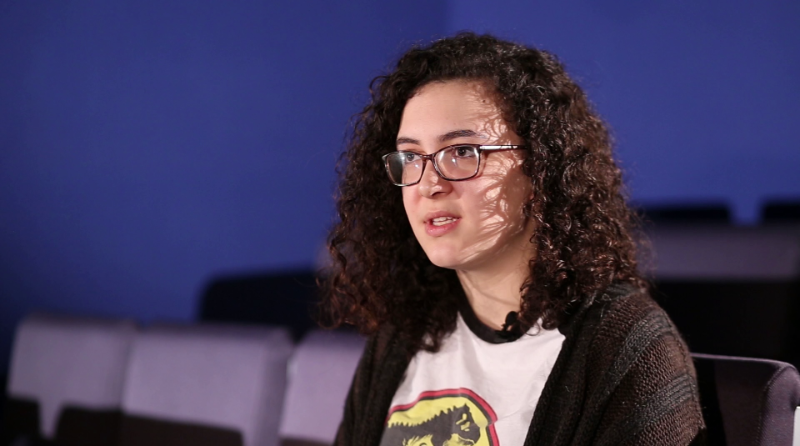Creative Writing and Film and Screen Studies
BA (Hons)
Undergraduate degree - combined honours
- UCAS codes: Institution B20, Course WW86 or SE58 (with professional placement year)
- Creative Writing - Programme Document
- Film and Screen Studies - Programme Document
Join our vibrant writing community, supported by award-winning authors and creative practitioners.
- Wide choice of fiction, performance poetry and graphic novels to scriptwriting, nature writing and memoir.
- Industry focused with an emphasis on developing your professional practice and employability.
- Your projects, your way, with our support. Literary festivals, publications, podcasts - we’ll help you find your voice.
Join us at Bath Spa University where writing is the thing we love to do and the thing we love to talk about. In our workshops, you’ll find friends for life who, like you, want to spend time in a writing world of imagination, creativity and experimentation.
You’ll enjoy working on our unique campus, surrounded by wildlife and a beautiful 18th-century landscape, perfect for creative inspiration. You might experiment with nature writing or discover poems and stories you’re driven to write as a response to climate change and environmental issues.
#1 in South West
for Graduate Prospects in Creative Writing (Guardian University Guide 2025)
#2 in South West
for Student Experience in Creative Writing (Sunday Times Good University Guide 2025)
Joint #6 in UK
for Value Added in Creative Writing (Guardian University Guide 2025)
Joint #7 in UK
for Graduate Prospects in Creative Writing (Guardian University Guide 2025)
“As well as strengthening my skills and confidence as a writer, Creative Writing at Bath Spa opened my eyes up to the range of career paths I could pursue that I hadn’t considered before. The tutors and Careers team supported me after graduation, all the way to my first full time creative role.”
Nic Crosara, 2019 graduate, now deputy editor of DIVA magazine
What you'll learn
Contemporary creative writing is diverse. It’s digital and on the page; social and singular. Our comprehensive programme includes prose fiction, YA, flash fiction, poetry, scriptwriting for live performance and screen, life writing and memoir.
In fact, whatever you want to write, you’ll find an opportunity to explore it with us. We have modules on graphic novels and comics alongside modules in live literature, creative enterprise and professional practice to support your career development. You'll have the opportunity to collaborate on creative projects with other students both within and outside Creative Writing.
You’ll be able to work on magazines, local literary festivals and podcasts, while collaborating with fellow students through our creative writing, publishing and journalism student-run societies.
Year one
The course is carefully designed to enable you to explore and experiment with your writing and understand the foundations of writing craft. In the Writer’s Workshop modules you’ll be introduced to an array of different writing forms and genres and you’ll be experimenting with them each week. You’ll have your first experience of the BSU writing workshop where you’ll learn how to work with other writers, giving and receiving feedback. You’ll have additional modules in poetry, fiction and script writing alongside a module where you’ll learn about the publishing industry and editing. You’ll also attend lectures from visiting writers and members of staff who will talk to you about their writing lives and experiences in the industry.
Year two
In the second year of the course, you have access to a range of modules that will enable you to specialise in a particular form or genre of writing. You’ll take a mixture of core and optional modules from a list that includes, for example, genre fiction, life writing, short stories, form and listening in poetry, and writing for screen. You will also take the project module, Professional Portfolio. This is an opportunity for you to develop your own creative project, designed to help you develop the skills you need as a professional writer. You will be assigned a member of staff to be your project supervisor. They will help guide and advise you as you develop your idea. If a collaborative project suits you, you can take a Publishing module where you work with a small team of fellow students to create your own independent magazine.
Year three
The final year of the programme is designed to consolidate your writing practice and support your progression into a writing-related career. You will take a dissertation-equivalent module in at least one of fiction, poetry, nonfiction, scriptwriting or writing for young people. These modules run through the year. Alongside that you have a choice of career-focused modules which include Live Literature and Professional Practice which offer you the opportunity to develop your own industry-facing creative projects. We also offer an extended project module, Creative Enterprise, over two semesters. This module helps you focus on developing a creative project into a commercial opportunity.
Assessment is based on 100% coursework (no exams). Most modules will require you to submit a portfolio of creative writing along with a reflective or contextual essay in which you describe what you have learned in class, what you have learned from the set texts and working on your own writing.
Creative Writing at Bath Spa University is taught through a mixture of workshops, lectures, presentations and tutorials. Workshops offer you the opportunity to read and discuss each other's work in a supportive, informal and informative atmosphere. Lectures are used to introduce techniques and themes in detail. Tutorials provide you with the opportunity to discuss your work with your tutor on a one-to-one basis.
We believe that for you to achieve your maximum potential you have to take yourself and your writing seriously, and that the best way to do this is to develop a professional approach. Therefore, wherever appropriate, our modules run to industry standards and adopt industry practices.
To find out more about how we teach and how you'll learn, please read our information on Your Learning and Teaching at BSU.
“Bath Spa allowed me to choose a career with confidence, as I learned what I was good at and what I enjoyed doing. The best thing about the course is the support, the module choices (which can really inform your path) and the work experience offered with local publishers or events and festivals.”
Laura Garcia Moreno, 2022 graduate, now Production Assistant and Environmental Champion at Bath Festivals
Facilities and resources
The Creative Writing course is taught at our stunning Newton Park campus, where you’ll be surrounded by wildlife and a beautiful 18th century landscape and lake.
You'll have access to a range of excellent facilities, including:
- Commons building with its state-of-the-art classrooms, study spaces and cafe
- Digital labs (Mac rooms) for students learning new media
- Virtual Learning Environment to support you in your modules.
As a Creative Writing student, you'll be able to benefit from:
- Cameras, audio recording equipment available for students to borrow absolutely free
- Technical staff to help students use industry standard software
- Library with print and ebooks, digital resources, literary magazines and journals.
Opportunities
As part of your degree, you could study abroad on a placement at one of Bath Spa’s partner universities.
Creative Writing students often find exciting subject-related placements and we do our best to help students make connections and gain experiences in companies and organisations that interest them. Students often work with the Bath Literature Festival, for instance, or with production companies such as the BBC. The course team will help you on an individual basis as opportunities present themselves.
Past students have benefited from industry-based opportunities and experiences that have been incorporated into their modules, enabling them to secure credit for the time they have spent in industry environments.
Current graduate careers include:
- Novelist
- Science magazine editor
- Children’s author
- Playwright
- Digital Marketing Executive
- Social media writer
- Commercial copywriter for brands or charities
- Regional editor for an online magazine
- University lecturer
- Editor (Random House)
- Poet.
Many of our students go on to study one of our specialist MA programmes in either Creative Writing, Writing for Young People, Screenwriting, Travel and Nature, or Children’s Publishing.
Each year Creative Writing awards a range of prizes to its students to celebrate the best writing produced in the final year. The department also awards the Les Arnold Prize for the top student in the second year, honouring the memory of poet Les Arnold, who started the writing programme in 1992.
Students are given numerous opportunities to focus on project work – from the first year core module (Writer's Workshop One) to the second year core module and into several project modules in the third year. Student projects are a core part of the Creative Writing curriculum and students are assisted to develop project ideas that support their creative and career ambitions.
Professional placement year
The Professional Placement Year (PPY) provides you with the opportunity to identify, apply for, and secure professional experience, normally comprising one to three placements over a minimum of nine months. Successful completion of this module will demonstrate your ability to secure and sustain graduate-level employment.
By completing the module, you'll be entitled to the addition of 'with Professional Placement Year' to your degree title.
Before your PPY, you'll work to identify roles of interest and secure a placement. The Placements Team will support through timetabled sessions and 1:1 appointments.
As well as completing a minimum of 900 placement hours, you will complete two assessments demonstrating your skill development, growth in professional behaviours and how the PPY has impacted your future career aspirations.
Fees
| Student | Annual tuition fee |
|---|---|
| UK full time | £9,535 |
| UK part time | £4,768 |
| International full time | £17,430 |
Professional Placement Year
During the placement year, the fee is reduced to 20% of the full time fee. This applies to UK and EU/International students.
- UK: £1,905
- International: £3,486
Additional course costs
You may need to pay additional course costs over and above your tuition fees, for example, for specialist equipment or trips and visits. Please check the course Programme Document (linked under the main image on this page) for details of any additional costs. You can also read our Additional Course Costs Policy for further information.
Funding opportunities
Please visit our Funding pages for an overview of the funding options that may be available, including scholarships and bursaries.
Interested in applying?
We welcome applications from students who demonstrate real commitment to their writing. This commitment may be expressed in publications, awards, and/or engagement with the Apprentice of Fine Arts in Creative Writing.
We accept a wide range of qualifications for entry to our undergraduate programmes. The main ones are listed below. Applicants without a relevant Level 3 qualification in English will be considered but will be required to submit a piece of their own creative writing as part of the selection process.
- A Level - grades BBB-BCC.
- BTEC – Extended Diploma grades from Distinction Distinction Merit (DDM) to Distinction Merit Merit (DMM) in any subject. Applicants will need to demonstrate a strong interest in Creative Writing in their personal statement.
- T Levels – grade Merit preferred.
- International Baccalaureate – a minimum of 32 points are required.
- Access to HE courses – typical offers for applicants with Access to HE will be the Access to HE Diploma or Access to HE Certificate (60 credits, 45 of which must be Level 3, at Merit or higher). Applicants will need to demonstrate a strong interest in Creative Writing in their personal statement.
If you don’t meet the entry requirements above, we may be able to accept your prior learning or experience from outside of formal education. See our Accreditation of Prior Learning (APL) page to learn more.
English Language Requirements for International and EU Applicants
IELTS 6.0 - for visa nationals, with a minimum score of IELTS 5.5 in each element.
Course enquiries
For further information about the programme or entry requirements, please email us at admissions@bathspa.ac.uk.
Ready to apply? Click the 'apply now' button in the centre of this page. Need more guidance? Head to our how to apply pages.
Course leader: Ms Lucy Sweetman
Email: l.sweetman@bathspa.ac.uk
Three year course
With placement year
Immerse yourself in the study of film and the film industries. Understand theory, criticism and the relationship between film, media and culture.
- An immersive experience in studying film and the film industries.
- You’ll have the opportunity explore your film interests and enthusiasms.
- Combines film theory and scholarship with film practice.
We want you to develop a critical understanding of film and screen theory and criticism and to appreciate the relationship between film, media and culture. But we also want to provide you with the conceptual tools for understanding how society and culture is mediated by cinematic, televisual and electronic images.
In choosing this course you’ll be starting on a journey of critical understanding of the institutions of film and screen production, distribution and exhibition. As part of this we’ll develop your understanding of reception and consumption practices in film and screen.
#1 in South West
for Satisfaction with Feedback in Media and Film Studies (Guardian University Guide 2025)
#1 in South West
for Satisfaction with Teaching in Film Production and Photography (Guardian University Guide 2025)
What you'll learn
Film and Screen Studies aims to produce graduates who have an informed, critical and creative approach to both understanding film and screen in contemporary society and to their own forms of critical, reflective and communicative practice. You’ll develop intellectual, analytical, research and creative skills that will help you to prepare for employment and have the opportunity to engage in practical filmmaking projects if you wish.
Year one
You’ll investigate film as a specific academic discipline, alongside how meaning is conveyed through film form and content. As part of your work you’ll analyse how films are constructed and be introduced to ways of writing effectively about film. You'll also undertake an advanced investigation of key theoretical and methodological issues involved in the study of cinema, and explore film as a commercial, cultural and aesthetic institution.
Years two and three
In years two and three you can design your programme from a range of exciting modules. You can also take part in organising LineUP, the annual Student Film Festival at Bath Spa University.
Our modules have well-defined teaching structures consisting of lectures, seminars, workshops and tutorials, which give you wide opportunities to learn progressively, stretch your capabilities, test your ideas and methods and interact positively with staff and other students in the department.
As you would expect, Film and Screen Studies modules also use parts of the new media in their teaching practice. Students are encouraged to make use of the University's virtual learning environment, 'Ultra' and of the web in seminars and workshops.
To find out more about how we teach and how you'll learn, please read our information on Your Learning and Teaching at BSU.
Assessment includes essays, research reports, journals, group presentations and portfolios.
Opportunities
As part of your degree, you could study abroad on a placement at one of Bath Spa’s partner universities.
Visits may include tours of famous UK film studios such as Pinewood and key film centres such as the BFI.
The main focus of interest for our Film and Screen Studies graduates is the creative and cultural industries in the UK. These industries include advertising, journalism, publishing, film and film-related employments, television, radio and the heritage sector. However, there are also employment opportunities in local and central government and the voluntary sector.
Since 2011, employers such as BBC Bristol, Argonon and The Sheffield International Documentary Festival have recruited graduates from this course. Students have also gone into roles including Unit Assistant, Festival Assistant and Film Location Manager.
Work placements are available within the programme through the second year Work Placement model. They can also be facilitated on an extra-curricular basis through members of the teaching team.
We encourage our filmmaking students to enter material for film competitions and festivals.
If you’re a full-time undergraduate student starting your first year at Bath Spa University, you can apply for the Certificate in Global Citizenship, which you’ll study alongside your degree.
You’ll gain global awareness and add an international dimension to your student experience, and funding is available. On successful completion of the programme, you’ll be awarded a Certificate in Global Citizenship. This is in addition to your degree; it doesn’t change your degree title or results.
Professional placement year
The Professional Placement Year (PPY) provides you with the opportunity to identify, apply for, and secure professional experience, normally comprising one to three placements over a minimum of nine months. Successful completion of this module will demonstrate your ability to secure and sustain graduate-level employment.
By completing the module, you'll be entitled to the addition of 'with Professional Placement Year' to your degree title.
Before your PPY, you'll work to identify roles of interest and secure a placement. The Placements Team will support through timetabled sessions and 1:1 appointments.
As well as completing a minimum of 900 placement hours, you will complete two assessments demonstrating your skill development, growth in professional behaviours and how the PPY has impacted your future career aspirations.
"The tutors support you throughout, bringing their own specialist knowledge to the course to make it interesting and engaging."
Claire Reynolds, Film and Screen Studies graduate
Facilities and resources
You'll be taught on our Newton Park campus, with access to a range of facilities including:
Fees
| Student | Annual tuition fee |
|---|---|
| UK full time | £9,535 |
| UK part time | £4,768 |
| International full time | £17,430 |
Professional Placement Year
During the placement year, the fee is reduced to 20% of the full time fee. This applies to UK and EU/International students.
- UK: £1,905
- International: £3,486
Additional course costs
You may need to pay additional course costs over and above your tuition fees, for example, for specialist equipment or trips and visits. Please check the course Programme Document (linked under the main image on this page) for details of any additional costs. You can also read our Additional Course Costs Policy for further information.
Funding opportunities
Please visit our Funding pages for an overview of the funding options that may be available, including scholarships and bursaries.
Interested in applying?
We value applicants who are self-reflective, creative and have good teamworking skills.
We accept a wide range of qualifications for entry to our undergraduate programmes. The main ones are listed below:
- A Level – grades BBB-BCC preferred.
- BTEC – Extended Diploma grades from Distinction Distinction Merit (DDM) to Distinction Merit Merit (DMM) accepted in any subject.
- T Levels – grade Merit preferred.
- International Baccalaureate – a minimum of 32 points are required.
- Access to HE courses – typical offers for applicants with Access to HE will be the Access to HE Diploma or Access to HE Certificate (60 credits, 45 of which must be Level 3, at Merit or higher).
If you don’t meet the entry requirements above, we may be able to accept your prior learning or experience from outside of formal education. See our Accreditation of Prior Learning (APL) page to learn more.
English Language Requirements for International and EU Applicants
IELTS 6.0 - for visa nationals, with a minimum score of IELTS 5.5 in each element.
Course enquiries
For further information about the programme or entry requirements, please email us at admissions@bathspa.ac.uk.
Ready to apply? Click the 'apply now' button in the centre of this page.
Need more guidance? Head to our how to apply pages.
We recommend these two introductory texts:
- Jill Nelmes, Introduction to Film Studies, Taylor and Francis, 5th Revised Edition 2015
- Richard Barsom and David Monahan, Looking at Movies, WW Norton, 5th Revised Edition 2015
Course contact: Suman Ghosh
Email: s.ghosh@bathspa.ac.uk
Three year course
With placement year
- Award
- BA (Hons) Creative Writing and Film and Screen Studies
- School/s
- Bath School of Art, Film and Media, School of Writing, Publishing and the Humanities
- Campus or location
- Newton Park and Locksbrook Campus
- Course length
- Three years full time, or four years full time with professional placement year. Part time available.
- UCAS codes
- Institution Code: B20
- Course Code: WW86 or SE58
- Campus Code: A,BSU
Entry requirements
We accept a wide range of qualifications for entry to our undergraduate programmes. The main ones are listed under 'Typical offers' in the main column below. For combined courses, please check both subjects. If your qualification is not listed, please email admissions@bathspa.ac.uk with your specific details.




